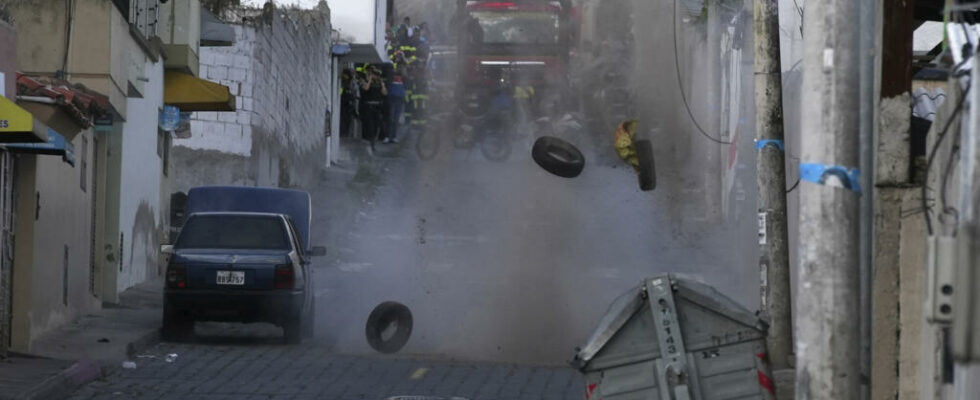There is no shortage of reasons to emigrate to Ecuador: rampant violence that makes the country one of the most dangerous in Latin America, an economic and social crisis, and power cuts of up to 14 hours a day. Added to this is the “ vacuna ” Or ” vaccine », too pretty a name to talk about extortion. This criminal activity is bleeding the country dry and affects all categories of the population.
4 mins
With our correspondent in Ecuador,
Mauricio Nuñez is one of the most popular romantic music singers in Ecuador. He formed a duo with his brother whose success did not escape the master singers. “ Our telephone numbers are often known to the public. THE delinquents call us, threaten us, ask us for money. I was a victim of ‘vacuna’ with my brother”, he confides. “The first time, we agreed to pay. The second time, we filed a complaint with the Public Prosecutor’s Office, and they no longer contacted us. They were asking for $1,000 a month. »
THE journaliststhey too, are not immune to extortion. Organized crime groups, or sometimes simple delinquents posing as mafiosi, do not hesitate to target the press. Isabela Ponce, editor of the GK portal, had the bitter experience of this. “ After a first threat on a Thursday, I received another message on Saturday. One of our police sources told us that the information about the threats appeared to be taken from the Internet. This reassured us, and we filed a complaint with the Public Prosecutor’s Office. They asked us for money for any publication about them. »
Also readEcuador in a state of “internal war”
“ They attacked me three times. A dynamite cartridge did not explode »
Coastal towns are bearing the brunt of the scourge of “ vacuna “. In Guayaquil, some residents have to pay just to have a roof over their heads. Victor Pinta, a grocer in the south of the city for almost nine years, testifies: “ They extort all businesses, even the smallest. They are asking for collaboration to protect us. But who are they to protect us? »
Victor refuses to give in. He testifies openly, despite incessant threats. To protect himself, he changes his cell phone number regularly. “ They attacked me three times. A dynamite cartridge failed to explode. A week later, they tried again near the garage, and this time it exploded. Then they tried to set the fire… »
Despite everything, he remains inflexible: “ No, I’m not going to pay, with God’s blessing. My neighbors support me. If we see suspects, we sound the alarm and we try to capture them to hand them over to the Police. »
Also readEcuador: government regains control of Guayaquil prison
“You have to pay, otherwise you die…”
Others chose to flee rather than fight. This is the case of a young woman met at the border in McAllen, Texas, who prefers to remain anonymous. She owned a small stationery store in Quito. “ The extortions began in exchange for not stealing from us. They asked for 300 dollars a week while I earn 80 when sales are good. But you have to pay, otherwise you die… »
Today, this woman lives in UNITED STATES with her partner and their two children. The situation in Ecuador, marked by a lack of work, jobs and resources, pushed her to flee. However, the rural sector remains less affected by this scourge, according to Flor Córdova, member of the indigenous community of Iluman. “ In indigenous communities, racketeers are punished with ice water, whipped with nettles, beaten. Sometimes they are offered to Pacha Mama, the Earth Goddess, and buried alive. »
Extortion linked to drug trafficking
Along the northern border, the evolution of traffic drug has led to an increase in extortion, according to Pablo Iturralde, director of the NGO “ Tierras para Todos “. “ The ‘vacuna’ on the northern border increased when the ‘white’ routes, used for the export of cocaine, were no longer land, but maritime, via the Pacific. All these young people who were lookouts or traffickers lost their income and began to extort teachers, small businesses, and local transporters with their vans. »
This phenomenon largely explains why more and more Ecuadorians are seeking to emigrate to the United States, whether they are legal or not.
Also readGaspard Estrada: drug trafficking in Latin America is a real “challenge” for States and institutions
